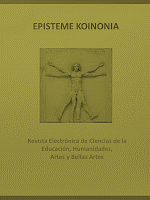Improving EFL students’ speaking skill through academic oral expression tasks at the high school level
DOI:
https://doi.org/10.35381/e.k.v5i9.1663Palabras clave:
Oral expression, speech education, cultural education. (UNESCO Tesauro).Resumen
One of the major concerns of teachers of English as a foreign language (EFL) is to get students to interact in the classroom; in this sense, this study analyzed the perceptions of specific strategies to improve speaking skills used by students at the "Ramona Auxiliadora Marcillo Chica" Educational Unit. A questionnaire was used to collect data, the results showed how students learn English and what strategies they use for this purpose; also, the data analysis indicates levels of commitment, autonomy, and a certain indifference with respect to EFL learning. This leads us to conclude that, students can improve their oral skills as long as English teachers implement effective strategies and methodologies in the classroom, such as reading aloud and the use of songs, which will enable students to improve their oral skills with accuracy and spontaneity.
Descargas
Citas
Bahrani, T., & Soltani, R. (2012). How to teach speaking skill. Journal of Education and Practice, 3(2), 25-29.
Birch, B. M., & Fulop, S. (2020). English L2 Reading: Getting to the bottom. Routledge, 4th Edition. https://doi.org/10.4324/9780429397783
Brown, S. (2005). Assessment for learning. Learning and teaching in higher education, 1, 81–89.
Buhari, B. (2019). Practicing Discussion in the Form of Pyramid to Improve Students’ Speaking Performance and Classroom Interaction. Journal of Languages and Language Teaching, 7(2), 108-116. https://doi.org/10.33394/jollt.v7i2.1958
Calle, A., Calle, S., Argudo, J., Moscoso, E., Smith, A., & Cabrera, P. (2012). Los profesores de inglés y su práctica docente: Un estudio de caso de los colegios fiscales de la ciudad de Cuenca, Ecuador. MASKANA, 3(2), 1–17. https://doi.org/10.18537/mskn.03.02.01
Chomsky, N. (1965). Persistent Topics in Linguistic Theory. Diogenes, 13(51), 13–20. https://doi.org/10.1177/039219216501305102
Chomsky, N. (1980). Rules and representations. Behavioral and Brain Sciences, 3(1), 1–15. https://doi.org/10.1017/s0140525x00001515
Dörnyei, Z. (2003). Attitudes, Orientations, and Motivations in Language Learning: Advances in Theory, Research, and Applications. Language Learning, 53(S1), 3–32. https://doi.org/10.1111/1467-9922.53222
Duarte, M., Tinjacá Bernal, L. M., & Carrero Olivares, M. (2012). Using songs to encourage sixth graders to develop English speaking skills. Profile Issues in Teachers Professional Development, 14(1), 11-28.
Education First. (2021). The world's largest ranking of English language proficiency. With data from 2 million participants in 112 countries and regions. Retrieved from https://www.ef.com.ec/epi/
Franco, P. (2012). Características psicométricas de un cuestionario en español para medir estrategias de aprendizaje del inglés como lengua extranjera [Psychometric characteristics of a Spanish-language questionnaire to measure English as a foreign language learning strategies]. Porta Linguarum Revista Interuniversitaria de Didáctica de las Lenguas Extranjeras. https://doi.org/10.30827/digibug.30919
Field, A. (2018). Discovering Statistics Using IBM SPSS Statistics. https://n9.cl/bbal7
Gibson, S. (2008). Reading aloud: a useful learning tool? ELT Journal, 62(1), 29–36. https://doi.org/10.1093/elt/ccm075
Harmer, J. (2001). The Practice of English Language Teaching (3rd Completely Revised, Updated ed.). Addison Wesley Publishing Company.
Jiménez, P. K. (2018). Exploring Students’ Perceptions About English Learning in a Public University. HOW, 25(1), 69–91. https://doi.org/10.19183/how.25.1.385
Kassem, M. A. M. (2018). Improving EFL Students’ Speaking Proficiency and Motivation: A Hybrid Problem-based Learning Approach. Theory and Practice in Language Studies, 8(7), 848-859. https://doi.org/10.17507/tpls.0807.17
Krashen, S. D. (1982). Principles and Practice in Second Language Acquisition (Language Teaching Methodology Series) by Krashen, Stephen D. (1982) Paperback (1st ed.). Pergamon Press. https://n9.cl/wds3
Krashen, S. D. (1991). The Input Hypothesis: Issues and Implications (1st ed.). Laredo Pub Co. https://n9.cl/thkvg
Lovia Boateng, D. S. L. (2018). Structural Equation Modelling Made Easy for Business and Social Science Research Using SPSS and AMOS.
McCarthy, J. (2006). Songs in the classroom Jamie McCarthy. teflcourse.net. Retrieved from https://n9.cl/vxfci
Mizener, C. P. (2008). Enhancing Language Skills Through Music. General Music Today, 21(2), 11–17. https://doi.org/10.1177/1048371308316414
Morales, C. (2008). Using rock music as a teaching-learning tool. Profile Issues in Teachers Professional Development, (9), 163-180.
Muslem, A., Zulfikar, T., & Asrila, I. (2017). Students’ perception of oral corrective feedback in speaking classes. English Education Journal, 8(3), 275–291.
Orlova, N. (2003). Helping Prospective EFL teachers learn how to use songs in teaching conversation classes. The internet TESL journal, 9(3), 12-15.
Patrick, R. (2019). Comprehensible Input and Krashen’s theory. Journal of Classics Teaching, 20(39), 37–44. https://doi.org/10.1017/s2058631019000060
Philips, S. (1993). Young Learner: Songs and chants. Oxford University Press. https://n9.cl/iafyb
Riadil, I. G. (2020). EFL Students in Speaking Skill: Identifying English Education Students’ Perceptions of the Psychological Problems in Speaking. JETAL: Journal of English Teaching & Applied Linguistic, 2(2), 8–20. https://doi.org/10.36655/jetal.v2i2.266
Richards, J. C., & Schmidt, R. (2002). Longman dictionary of applied linguistics and language teaching. Longman. https://n9.cl/687vr
Stanovich, K. E. (1991). Changing models of reading and reading acquisition. In L. Rieben & C. A. Perfetti (Eds.), Learning to read: Basic research and its implications (pp. 19–31). Lawrence Erlbaum Associates, Inc
Thornbury, S. (2005). How to Teach Speaking (1.a ed.). Pearson Educación.
Publicado
Cómo citar
Número
Sección
Licencia
CC BY-NC-SA : Esta licencia permite a los reutilizadores distribuir, remezclar, adaptar y construir sobre el material en cualquier medio o formato solo con fines no comerciales, y solo siempre y cuando se dé la atribución al creador. Si remezcla, adapta o construye sobre el material, debe licenciar el material modificado bajo términos idénticos.
OAI-PMH URL: https://fundacionkoinonia.com.ve/ojs/index.php/epistemekoinonia/oai







